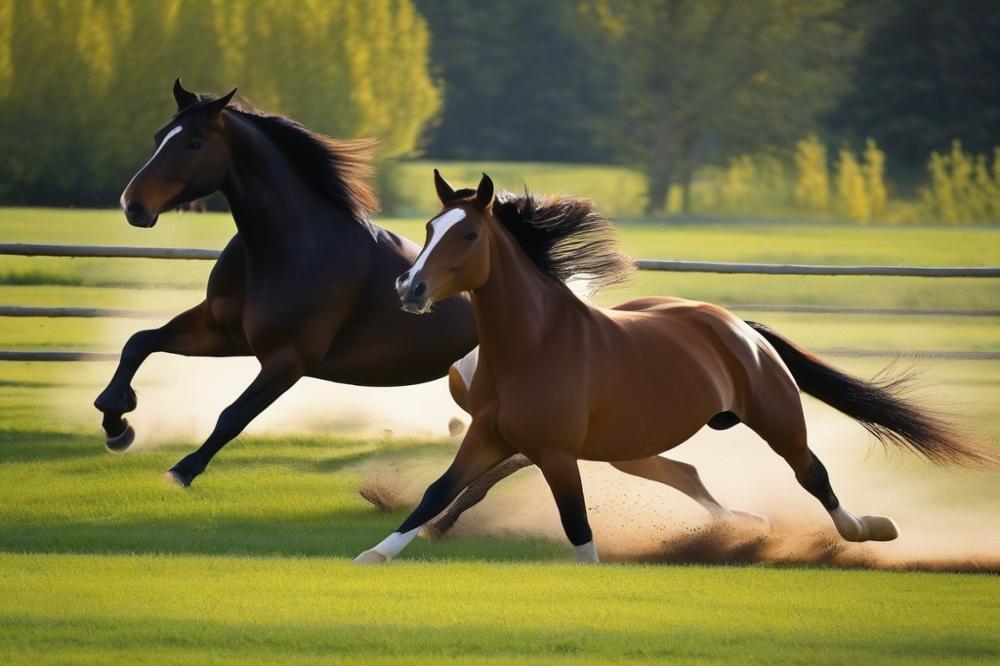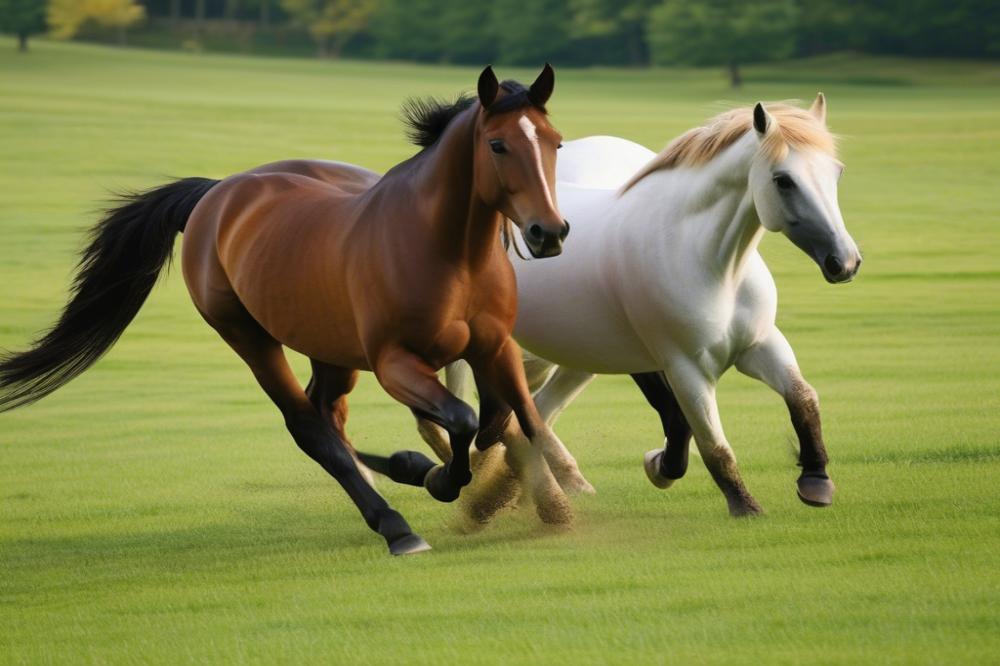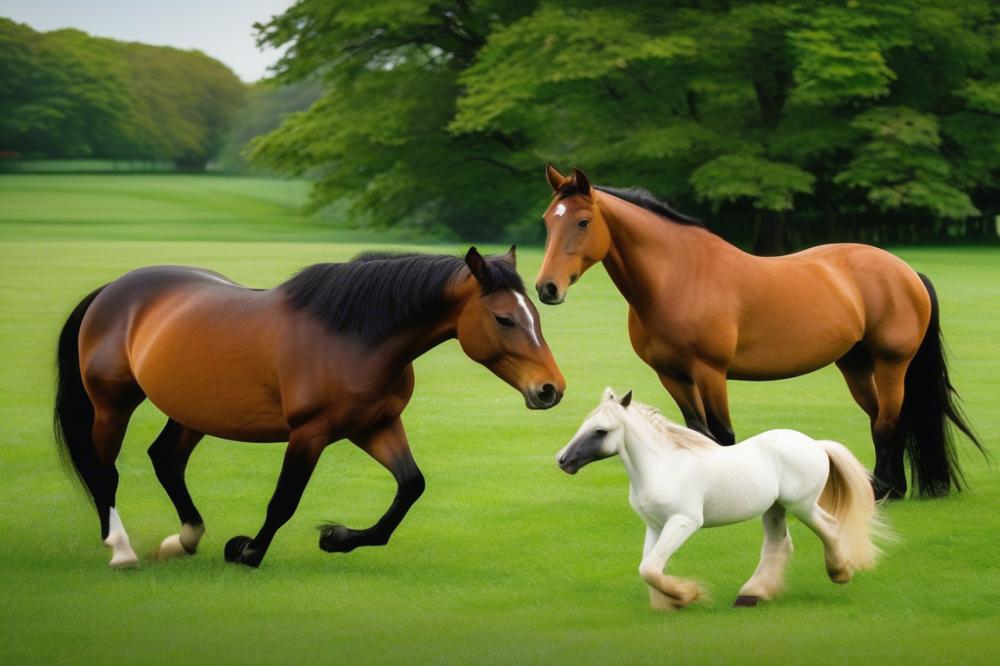The Importance of Play and social interaction in a Horse’s Daily Life
Horses are more than just majestic creatures; they are social beings with emotional needs. Play is a natural aspect of their behavior. Engaging in fun activities is crucial for their development and well-being. Through play, horses learn important skills that shape their personality.
Observing horses at play reveals their complex social structures. They communicate and bond through playful interactions, which helps to strengthen their relationships. This social interaction is vital for their mental and emotional stability. Without it, horses may become stressed or anxious.
Physical activity during play also contributes to a horse’s overall health. It promotes fitness and keeps their muscles strong. This exercise boosts their immune system, helping them ward off illnesses. Additionally, playtime reduces boredom and alleviates anxiety. A happy horse is a healthy horse.
Understanding the significance of horse play sheds light on animal welfare. When horses have the opportunity to engage in playful behavior, they thrive. Their happiness directly impacts their quality of life. Providing an environment that encourages this behavior is essential for both owners and the horses themselves. Prioritizing play and social engagement fosters a deeper connection with these incredible animals.
The Role of Play in equine behavior

Play acts as a vital aspect of a horse’s existence. It reflects their natural instincts and behaviors, helping them develop skills essential for survival. When horses engage in playful activities, they learn important social cues from their herd mates. This learning process is imperative for their communication and social hierarchy.
There are two main types of play: solitary and social. Solitary play includes activities like running, bucking, or even rolling on the ground. Such behavior improves their physical condition while allowing them to stretch muscles and practice coordination. Social play, on the other hand, involves interactions with other horses. In these scenarios, you might observe them chasing, nipping, or even engaging in synchronized movements. These interactions foster relationships and deepen social bonds.
Physical activity gained through play serves more than just exercise. It acts as a way for horses to relieve stress and express their emotions. Stress can build up in any animal, including horses. Engaging in play gives them an outlet to release those pent-up feelings. Thus, playtime contributes to their overall mental well-being.
Interactions during play reveal much about herd dynamics. Horses establish their roles while playing. Hierarchies become clearer through playful contests and racing. In a herd, younger horses may learn from older, more experienced ones. Observing experienced horses can guide youngsters on how to interact during various situations. This type of behavior plays a crucial role in ensuring the social structure remains intact.
In a natural setting, play serves to build bonds, develop skills, and promote health. Just like us, horses flourish in environments that encourage positive social interaction and playful behavior. Their daily life benefits significantly from these activities, reinforcing the idea that play is not merely trivial, but essential for their happiness.
Enrichment Through Social Interaction

Social interactions among horses are vital for creating companionship and supporting herd dynamics. Horses are herd animals by nature. They thrive in groups, finding comfort and security in the presence of their peers. When horses interact, they form strong social bonds that enrich their lives and contribute to their overall well-being.
These social connections influence horse behavior in various ways. Play is one such behavior where horses engage with each other in a light-hearted manner. This play fosters trust and helps build relationships within the group. Through activities like grooming, nuzzling, and even chasing, horses exhibit their social skills and establish their place in the hierarchy.
Emotional health is significantly affected by social bonds. Horses with strong, positive relationships experience less stress and are generally more content. They often display calmer behaviors when surrounded by familiar companions. Such interactions promote stability and can lead to a more relaxed environment.
On the flip side, isolation poses serious risks to horses. Being alone can lead to loneliness and anxiety. Horses that lack social interaction may exhibit signs of distress, such as excessive whinnying, pacing, or even abnormal behaviors. The consequences of isolation can diminish a horse’s quality of life.
Creating opportunities for horses to socialize is essential for their happiness. Owners and caretakers should consider the importance of herd dynamics when managing their horses. Providing companionship not only aids in their emotional well-being but also enriches their daily routines. A socially fulfilled horse is more likely to exhibit positive behaviors, enjoy physical play, and live a healthier life.
Physical and Mental Health Benefits
Engaging in various forms of play is crucial for a horse’s health. Exercise is essential for maintaining a healthy weight. Regular activity helps to build strong muscles and improve cardiovascular health. By moving around, horses burn calories, which prevents obesity. This is particularly important as overweight horses can face numerous health issues.
Interaction with other horses further enhances their physical wellbeing. Running, jumping, and chasing are all parts of social play. These activities promote agility and coordination. Horses that engage regularly in such movements often show improved physical performance in their daily tasks.
Beyond physical health, mental stimulation also plays a significant role in a horse’s life. Boredom can lead to destructive behavior or anxiety. When horses interact with peers or their environment, they are challenged mentally. This stimulation can reduce stress levels and enhance their overall mood.
Moreover, regular social interactions allow horses to develop important behavioral skills. They learn to communicate better with each other through body language and sounds. Such skills are not only vital for their social lives but also translate into better training outcomes. A horse that is mentally stimulated and relaxed is easier to train and manage.
Providing opportunities for play and interaction is beneficial for horse owners, too. When horses are happy and engaged, they are less likely to exhibit problematic behaviors. This results in a more harmonious relationship between horse and owner. A proactive approach to ensuring playtime allows for a well-rounded development.
In summary, physical activity and mental engagement are intertwined in a horse’s daily life. Both contribute significantly to their health and happiness. Owners who enable play and social interaction are investing in a healthier, more balanced equine partner.
Creating Opportunities for Play
Horse owners have a significant role in facilitating play and social interaction. Simple changes in routine can make a big difference. For instance, providing a safe area for horses to run and interact is essential. A spacious paddock or pasture helps horses explore their natural instincts. Fencing should be secure, allowing for free movement without risks.
Introducing toys adds excitement to their environment. Options like large balls, colorful barrels, or even hanging feed toys can spark interest. Choose items that are durable and safe for horses. These toys not only stimulate activity but also foster curiosity. Different textures and colors can create an engaging atmosphere.
Group dynamics also matter. Horses are herd animals. They thrive in social settings. If possible, keep compatible pairs or small groups together. Monitoring their interactions can be beneficial. Sometimes one horse may need a buddy to encourage playfulness.
Using obstacle courses can be entertaining and mentally stimulating. Set up simple challenges using poles or cones. Horses can practice walking, trotting, or even jumping over them. These activities promote physical fitness and mental engagement. Regularly changing course layouts keeps the experience fresh and exciting.
Incorporating daily routines that allow time for play is crucial. Schedule specific times for exercise and interaction. Consistency helps horses establish patterns. Daily enrichment activities can also include trail rides or leisurely walks. These experiences strengthen the bond between horse and owner.
Environmental enrichment can take various forms. Planting safe, horse-friendly plants around their space keeps them curious. Rotate the location of feed and water sources to encourage exploration. These changes stimulate their senses and keep their minds active.
Remember, the goal is to promote well-being through enjoyable experiences. Observing horses during play can reveal their personalities. It’s essential to recognize what makes them happy. Engaging them in play is an important step toward a healthier, happier life.
The Critical Role of Play and Social Interaction
Daily life for a horse should not only revolve around work and exercise. Play and social interaction are crucial aspects that contribute significantly to the well-being of these majestic creatures. Engaging with other horses through playful activities fosters strong relationships. Such interactions can reduce stress levels and promote a sense of security and happiness in each animal.
A horse that participates in varied activities experiences improvements in both mental and physical health. These benefits include increased agility and problem-solving abilities. When horses play, they display unique behaviors that are essential to their nature. This is vital for their overall equine behavior and development.
Animal welfare must remain a priority for every horse owner. Understanding that horses thrive in an environment enriched with companionship and opportunities for play is essential. Owners can create a nurturing space that encourages these beneficial interactions. By providing access to other horses and stimulating environments, they facilitate healthier lifestyles.
Taking time to prioritize interactions with companions will reward both horse and owner. Happy, well-socialized horses are typically more willing to learn and cooperate. That creates a harmonious relationship, ultimately enhancing the bond between the horse and its handler. When equine play becomes part of the daily routine, it elevates the quality of life for horses.
In the end, ensuring that horses experience diverse social settings and engaging activities provides great advantages. It is time to embrace the joy of play, not just as a luxury, but as a vital component of horse care. By doing so, owners can help their horses flourish and lead fulfilled lives.



